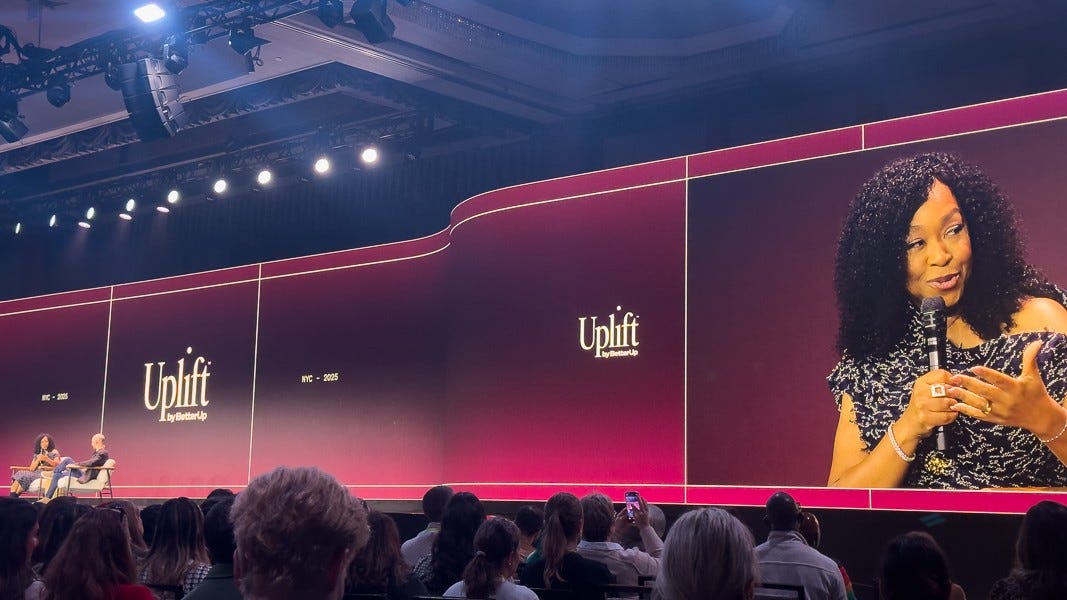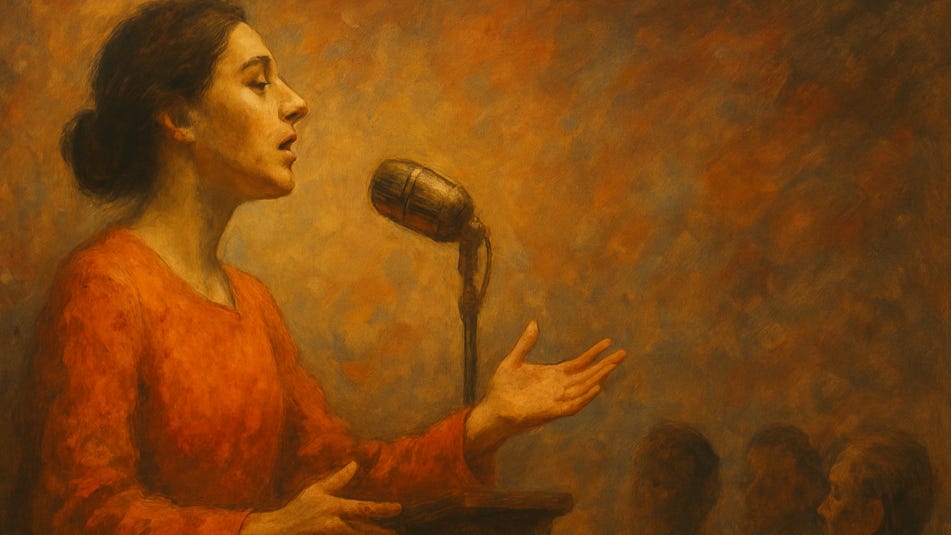This week, Jacquelyn and I had the incredible opportunity to attend the BetterUp Uplift Conference in New York. We have been friends with the BetterUp team, especially Alexi Robichaux and Damian Vaughn, PhD, for several years, but it was at this event that we witnessed the remarkable transformation of BetterUp from a coaching company to a holistic leadership development organization. BetterUp has emerged as a frontrunner in merging human coaching with AI and analytics to create personalized learning and development journeys for leaders at scale. The conference brought together a diverse array of thought leaders and innovators, each offering unique perspectives on the future of leadership and the role of technology in driving positive change. Among the many insights shared, three powerful conversations stood out, highlighting the importance of creativity, vulnerability, and authenticity in leadership.
Susan Magsamen and Ivy Ross, authors of the book "Your Brain on Art," shared their insights on the transformative power of creativity during a brain-bending presentation. They challenged the common perception that the arts are merely a form of entertainment or a luxury, arguing instead that engaging in creative activities is essential to our well-being and productivity. Magsamen and Ross presented compelling research demonstrating the numerous benefits of the arts, from reducing stress and extending life expectancy to enhancing cognitive skills and learning. They emphasized the power of interactive exhibits to engage all of our senses and strengthen memory, and noted the growing trend of doctors prescribing museum visits to address various physical and mental health concerns. They spoke of the importance of creating offsites and time away from the office to pursue creative projects together as a powerful way to enhance community, collaboration, culture-building, and creativity.
In a thought-provoking dialogue, comedian Trevor Noah and NYT bestselling author Brené Brown explored the transformative power of vulnerability in leadership. They emphasized that by being willing to expose our own imperfections and struggles, we create a space for others to do the same, fostering a culture of empathy and understanding. Noah posits that comedy only lands if the speaker is vulnerable in some way, and the same is true of leadership. He highlighted how vulnerability allows us to see and articulate things that often go unnoticed or unsaid, while Brown encouraged leaders to bring their full selves to work, embracing the messy and uncomfortable aspects of their lives. Together, they underscored the idea that vulnerability is not a weakness but rather a strength that enables us to lead with greater authenticity and impact, building trust and connection with our audiences and teams alike.
Famed TV writer Shonda Rhimes and NYT bestselling author Adam Grant engaged in a captivating conversation about the power of authenticity in leadership. Rhimes shared her personal journey of learning to say "no" to the things that no longer served her and then, subsequently, discovering the power of saying "yes" to the opportunities that aligned with her values and passions. Her refreshing bluntness and clarity demonstrated why she is such a successful storyteller and leader in film. Grant, drawing on his extensive research, emphasized the importance of staying true to ourselves and our values, allowing our authentic experiences and perspectives to shape the way we lead and inspire others. Together, they highlighted that by navigating the challenges and opportunities of leadership with authenticity and purpose, we can drive meaningful change and foster a culture of trust and growth.
BetterUp Uplift provided a rich and inspiring context for exploring the future of leadership and the role of technology, creativity, and human connection in driving positive change. The insights gained from the powerful conversations between Susan Magsamen and Ivy Ross, Trevor Noah and Brené Brown, and Shonda Rhimes and Adam Grant reinforce the value of embracing creativity, vulnerability, and authenticity in our leadership journeys. By fostering a culture of creative expression, bringing our full selves to work, and staying true to our values we can unlock the full potential of our teams and navigate the complexities of leadership with greater purpose and impact for those we lead and love.
With love, gratitude and wonder.
Scott
Get Your Team Members Unstuck: The Power of Making Requests by Deborah Riegel
In her article, Deborah Grayson Riegel shares a personal anecdote about working with her personal trainer, who challenged her to push herself beyond what she thought she was capable of. This experience led Deborah to reflect on the value of making big requests of others, particularly in her role as a leadership coach. She argues that as a leader, it's important to see the potential in your team members and make requests that encourage them to grow and develop, even if those requests initially seem daunting or overwhelming.
Deborah emphasizes the importance of distinguishing between requests and requirements, and building trust with team members so they feel comfortable responding honestly to requests. She also highlights the role of leaders in setting high expectations and providing the support and belief necessary for team members to reach them. Deborah concludes by noting that great growth often starts with someone else believing in you before you fully believe in yourself, and that making huge requests is an excellent strategy for leaders to help their teams reach their full potential.
Research Finds That Smaller Influencers Deliver Bigger Business Results. by Vanessa Patrick
Vanessa Patrick's recent article highlights an important shift in influencer marketing strategy. According to research from the Journal of Marketing that she discusses, micro-influencers (those with fewer than 50,000 followers) often deliver superior return on investment compared to celebrity influencers. My friend Vanessa points out that while a micro-influencer might charge only $50 per post yet generate over $1,000 in returns, macro-influencers charging $1,000+ rarely exceed six times ROI. This effectiveness stems from three key factors: the authenticity that smaller influencers bring to their recommendations, their higher audience engagement rates rather than mere impressions, and the cost-effective targeting they enable.
The article challenges conventional marketing wisdom by asserting that influence no longer equals fame. Vanessa argues that brands should prioritize connection, credibility and community over sheer reach. She emphasizes that micro-influencers foster deeper trust with their audiences - both cognitive and emotional - creating followers who are genuinely attentive rather than passively scrolling. This approach allows marketers to diversify their outreach with multiple targeted campaigns across different audience segments instead of investing their entire budget in a single high-profile influencer.
If You’re Saying Yes Too Often, Examine How You’re Saying No by Whitney Johnson
Whitney Johnson shares insights from her friend Vanessa Patrick, a consumer psychologist who wrote "The Power of Saying No." Patrick's journey began in India, where family expectations pushed her toward becoming a doctor. Despite completing pre-med training and facing strong cultural pressures to conform, she ultimately refused this path. This pivotal decision shaped her future approach to boundaries, leading to her successful career as an associate dean at Houston's Bauer School of Business.
Patrick's concept of "empowered refusal" offers a framework for saying no effectively. She suggests first identifying why you want to decline something and connecting that reason to your personal identity, then establishing clear personal policies that provide structure for refusals. When these boundaries are communicated authentically, people typically respond more positively than expected. Johnson emphasizes that this practice helps prevent burnout and allows individuals to focus on what truly matters, enabling them to navigate their growth journeys on their own terms.














Thank you so much for your efforts in bringing so much to us, Scott. I loved reading about the BetterUp Uplift conference and the content from various articles! I wanted to share some thoughts ignited by your content.
1. Susan and Ivy's view that art can destress is great. Of course, it goes on the assumption that art is not the person's profession.
2. In the context of Brene and Noah, Vulnerability is a strength only when the person has attained influencer (or leadership) status. Until then, it can prove to be a weakness. Someone who shows vulnerability without getting to a position of strength may be branded a loser.
3. Authenticity is a good trait, as Shonda and Adam say. At the same time, culture plays a very important role in how we express our authenticity. One may be direct from a Western context, but the same approach may not work in different cultures.
4. I couldn't agree more with Deborah Grayson Riegel's article. I recently delivered a three-minute talk (TMT) at a virtual nanoconference that I thought I would share with you. I hope you find it interesting!
https://www.linkedin.com/posts/knsudhirrao_tmt-2025-sudhir-rao-activity-7314866324952743936-Z8Ek?utm_source=share&utm_medium=member_desktop&rcm=ACoAAADAVXEBFPpzB-3H_4MJA-dwuQq2EVzXQi0
5. I found the marketing content intriguing.
Thank you for sharing so much enriching content!